
The Tokyo Metropolitan Government conducted a “Survey of Men’s Housework and Childcare” targeting 5,000 men and women living in Tokyo. The survey revealed a gap between married couples regarding housework and childcare, as well as concerns about how to interact with their partners and children. We asked Dr. Tei, a popular childcare teacher with a total of 2 million followers on social networking sites, to give us some advice!
It’s hard to find time to spend with my children. What are some tips to deepen my relationship with my children in a short period of time?
– According to a survey conducted by Tokyo Metropolitan Government, many men were worried that they could not find time for housework and childcare. This may be due to the fact that they work longer hours and come home later than their female counterparts.
Tei Sensei: I often tell fathers that if they want to get to know their children well, they should not try to get involved themselves, but rather “make a move that will make the children want to get involved.
To do this, it is important to ask the mothers about their children’s favorite games or new interests.
For example, if the child has recently gotten into Plarail, instead of saying, “Let’s play with Daddy! If you are building tunnels and so on, it is easier for the child to approach you and ask, “What are you doing, Daddy? and “What are you doing? The key is to create a composition that makes the child think, “I want to play with my dad.
For fathers who are worried that they don’t have enough time for housework and childcare, it would be a good idea to share information with mothers more often than they are aware of, such as what their children like and what picture books they are reading these days.
– In the survey, “playing with children,” “putting children to bed,” and “bathing” were the top three responsibilities that women want their partners to take on. In households where moms are responsible for most of the day-to-day tasks, when the responsibility changes to dad, the children may say, “No, dad! When the responsibility changes to the father, the children may say, “I don’t want to be the father! What should we pay attention to?
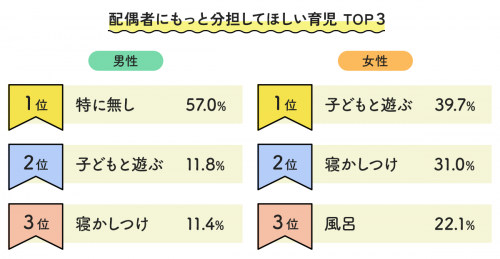
Source: [From the 2025 Survey Report on Men’s Housework and Childcare: “Childcare I Want My Spouse to Share More of the Work” (survey subject*1)].
Dr. Tei: For example, when it comes to “changing clothes,” some mothers make children take off their jackets first, while others make them take off their pants first, and children as young as 2 or 3 years old may say, “No daddy! If the order is different from the usual, children as young as 2 or 3 years old may become “No daddy! It is a good idea to ask the mother about the usual way to put the child to bed or bathe him or her, or to do it with the mother at first. If you don’t have a trusting relationship with your child, there is no way he/she will fall asleep or take a bath if you try to put him/her to sleep out of the blue. I think it would be difficult to build up a trusting relationship without talking to the child and communicating with him or her.
The first step in expressing gratitude is to “observe.
– The “communication gap” between couples (the result that men think they are expressing their appreciation, but women are not really getting it) was observed in the survey. What are some key points about how couples express their gratitude to each other?
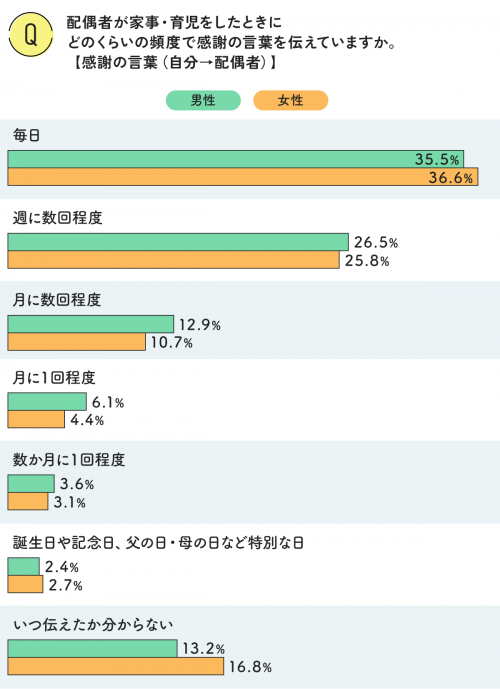
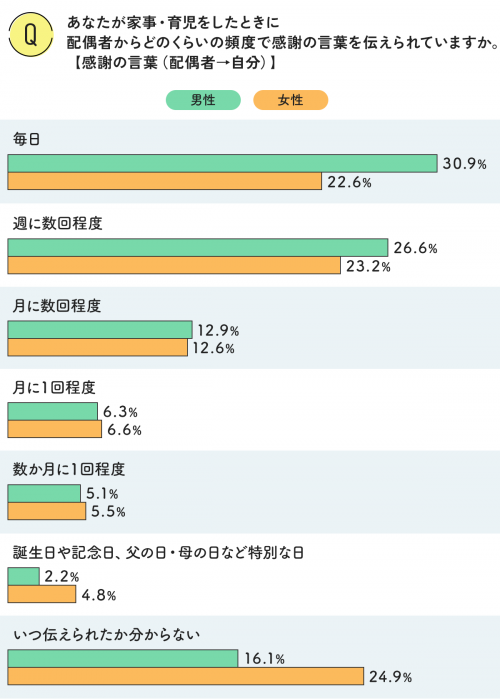
From “How often does your spouse express gratitude to you when you do housework and childcare?” and “How often does your spouse express gratitude to you when you do housework and childcare?
Dr. Tei: The point of expressing gratitude to your partner is exactly the same as when praising a child. If you praise your partner while missing the timing when you want him or her to praise you the most, he or she will not be happy.
For example, if a child wins first prize at an athletic meet and looks happy, but you don’t praise him immediately until the next morning, the timing is way off. Also, if the child wants to be praised most for dancing afterwards, rather than for running the race for the first prize, the praise will be misplaced and the feelings will not be conveyed.
The same goes for thanking your partner; if you don’t tell him immediately when he eats the meal that Mom cooked, and the next day you say, “It was delicious, thank you,” you are out of sync with the timing that Mom wants you to thank her for. Or, if Mom wants to thank Dad for keeping the kids out of the study so that he could get his work done before the meal, then she is missing the point.
In order to deliver feelings properly, it is important to observe the other person carefully so that there are no gaps in timing or content.
When a couple expresses their gratitude to each other after observing each other, the children who are watching them will also get into the habit of observing the other person. Observing is also connected to being considerate of the other person and reading the atmosphere of the situation, and I believe it is a useful habit in life.
When talking about what you want to see improved, tell your partner the good things first.
– The fathers and mothers commented, “When I ask my partner to do something or fix something, I try to be careful how I say it, such as, ‘Can I have him do it for me? I try to be careful about how I say it. One of them said, “I try to be careful about the way I say things, such as ‘Can I have you do it? What should we pay attention to when making a request or pointing out a problem?
Dr. Tei: First of all, it is important to observe. If you don’t observe and praise what they do on a regular basis and then tell them what you want them to improve, they will feel like they are being blamed all the time, saying “this and that is not good enough.
For example, if you want someone to fix the lock on the front door, it would be more pleasant to say, “Thank you for always keeping my shoes neatly lined up,” and express gratitude for the other things they do, and then ask, “It would be great if you could keep the lock closed as well. This is exactly the same in child-rearing; rather than being told, “Why can’t you do it?” Rather than being told, “Your meal looks delicious. It tastes better if you eat without putting your elbows on the table. It is better to make the other person feel that way anyway, whether it is your child or your partner.
If you say, “Papa’s fried rice is so delicious! If you say, “The kids loved it, too,” they may say, “Well, let’s make it again next time. I think it is easier to succeed if you think about how to make your child want to do what you want him to do, rather than how to make him do what you want him to do.

How do you bridge differences in values about parenting?
– Many complained about the way their partners treated their children, how they spoiled them too much, and other child-rearing practices. How should we accept these differences in values between couples?
Dr. Tei: If a couple feels that they have different values regarding child-rearing, the first step is to talk about it. Even if you do talk about it, you need to “observe. For example, “Can we talk about this now? If you don’t observe and communicate in small ways, and if you suddenly talk about something you can’t stand, the other person may say, “Why are you telling me now? If you are feeling uncomfortable, you should not talk about it unless you are able to do so. If there is something you feel uncomfortable about, it is easier for the other person to accept it and fill in the gaps if you talk about it as much as possible each time. If you are steady and diligent in observing and sharing information on a regular basis, you will also be able to imagine what the other person is thinking, such as, “Well, my mom talked to my child this way, but I wonder if she thinks differently than I do.
This may seem like a difficult task, but it can always be put into practice if you have an interest in the other person. By taking an interest, it is easy to notice small changes, and if you feel that something seems difficult, you may realize what you can do to help.

Men’s participation and sharing of household chores and childcare is not always ideal for a fifty-fifty split.
– According to a survey conducted by the Tokyo Metropolitan Government, approximately 60% of respondents felt that men’s participation in housework and childcare is progressing. How did Dr. Tei feel about the results of this survey?
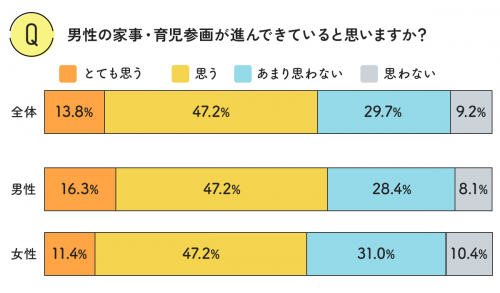 From “Do you think men’s participation in housework and childcare is increasing?
From “Do you think men’s participation in housework and childcare is increasing?
Dr. Tei: Men’s participation in housework and childcare is a good thing in itself. However, I believe that there must be a balance that suits each family in terms of sharing the workload. For example, in some families, fathers are mainly responsible for housework, while mothers are mainly responsible for childcare. For example, in some families, I think it is appropriate for dad to be mainly responsible for work and mom to be mainly responsible for housework. I don’t think it is necessarily ideal to share housework and childcare on a fifty-fifty basis.
I would like couples to discuss “who should do what and how much is ideal in our family” and find the best balance.
Rewarding yourself” makes your family happy.
– Both fathers and mothers responded that what they want most is “time for myself. What can we do to secure time for ourselves in our busy lives?
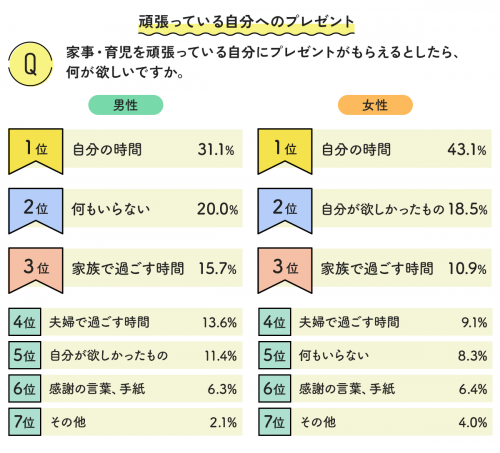 From “Gifts for Yourself Who Are Working Hard” (surveyed*1)
From “Gifts for Yourself Who Are Working Hard” (surveyed*1)
Tei Sensei: One of my themes is “how to make room for the parents. In this context, I feel that many people misunderstand how to make time for themselves. For example, when you want to read a book or watch a streaming drama in the evening, if you try to do it in your spare time without reviewing your usual routine, it won’t work out very well. If you want to make time for yourself, you should first schedule that into your schedule. Then, you need to reverse the idea of doing the routine in the extra time.
If you decide to make time for yourself on this day, you can rely on such things as delivery of meals, prepared foods, frozen foods, and so on.
Many people always put their children and family first, and take care of themselves later, but you cannot be kind to your family if you are not kind to yourself first. In this sense, it is important to reward yourself with time for yourself. A reward does not mean buying a brand name bag or something like that, but rather buying and eating chocolates for yourself, or buying your favorite flower, etc. I think it depends on how much you can accumulate things that you can think of as “I did this for myself in a day”.
The more opportunities you have to do even one thing just for yourself alone, the happier you will be and the more you will feel. If you actively think about what you can do to make yourself happy first, your family will be happier as a result. I hope that fathers and mothers who struggle daily with housework and childcare will take care of themselves as much as they do their children.
Survey Source.
Report on the 2025 Survey on Men’s Housework and Childcare. https://www. seikatubunka.metro.tokyo.lg.jp/danjo/wlb_top/0000001374/R7chosa
Method: Web-based survey / Period: July 15-August 21, 2025 Survey targets: *1 4,000 men and women with preschool children (half men and half women), *2 1,000 men and women aged 18-69/ Surveyed by: Tokyo Metropolitan Government
[Dr. Tei PROFILE]
An active childcare worker, she has a total of about 2 million followers on social networking sites and is active in a wide range of genres.
His specific child-rearing methods are full of innovative ideas, and he is overwhelmingly supported by parents as “the child-care specialist I want to consult most now.
He has appeared on TV and in numerous other media, and his activities have expanded to include writing books and giving lectures.











